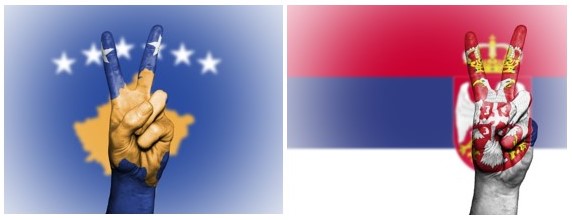At the end of February, the leaders of Serbia and Kosovo agreed a provisional deal to normalise relations, without however signing it. More talks are planned, with the two leaders, Serbian President Aleksandar Vučić and Kosovo’s Prime Minister Albin Kurti, schedulded to meet in North Macedonia’s lakeside city of Ohrid on March 18, under EU auspices.
The European External Action Service has published the official agreement.
The text of the #EU Proposal – Agreement on the path to normalisation between #Kosovo and #Serbia is now posted on the @eu_eeas website. https://t.co/lG56laur0r
— Ian Bancroft (@bancroftian) February 27, 2023
The provisional deal includes provisions as for example the fact that Serbia will not block Kosovo from applying for membership to international organisations such as the EU and the United Nations.
The EU’s High Representative for Foreign Affairs and Security policy, Josep Borrell commented:
“I hope the Agreement can also be the basis to build much-needed trust and overcome the legacy of the past. Much-needed trust” (…) “Further negotiations are needed to determine specific implementation modalities of the provisions.”
Serbia, Kosovo back normalising ties but need more talks -EU's Borrell https://t.co/NUrZpj11D0 pic.twitter.com/nT8WyjQVFT
— Reuters (@Reuters) February 27, 2023
Donika Emini, a political analyst who has followed the developments between the two countries for years, comments to Euronews:
“There were protests both in Pristina and Mitrovica ahead of the agreement. Everyone seems to be confused and let down by the process” (…) “The actual impact this document but also the negotiating process is going to have, the ways it could improve their lives, is unclear to the wider population so people are not sure how they should react to it at the moment.”
RFE/RL Europe Editor Rikard Jozwiak takes a close look as well, writing:
“There are some caveats, though. A senior EU official familiar with the talks told me that the text lacks any validity without the annex, which the two sides will work up before their next meeting in Ohrid, North Macedonia, on March 18…The real test for progress might come this spring. First, Kosovo is seeking to join the Council of Europe; and second, the 27 EU member states will seek consensus in order to send Pristina’s EU application from the European Council, which defines the political direction and priorities of the EU, to the European Commission to prepare a legal opinion. In both cases, Belgrade has been working behind the scenes to hamper any progress, according to several EU officials familiar with the issue but who are not authorized to speak on the record.”
Commenting on the deal, German ECR Lars Patrick Berg stated:
“The visit of Deputy Prime Minister Besnik Bislimi from Kosovo to the European Parliament’s Foreign Affairs Committee reminds us not to forget Kosovo. The threat from Serbia is steadily growing and Europe seems increasingly distracted. The EU needs a clear stance.”
What is the outcome of the meeting between Kosovo and Serbia in Brussels and can a full agreement on normalization be reached? @MiroslavLajcak,@eu_eeas, joins @IlvaTare to discuss the EU brokered plan for normalization and more for a new #BalkansDebrief. https://t.co/4Ezt2lUBGa
— Europe Center (@ACEurope) March 3, 2023
Leaked 🇫🇷🇩🇪 plan for 🇽🇰&🇷🇸:
-🇽🇰&🇷🇸 recognize each other national symbols & documents
-de facto recognition of 🇽🇰's sovereignty
-🇷🇸 can't represent 🇽🇰, and will not oppose its memb. in int. orgs
-self-governance for Serbs in 🇽🇰
-exchange permanent missions
-financial aid from 🇪🇺 pic.twitter.com/i2L0WUo1LW— kos_data (@kos_data) January 22, 2023

